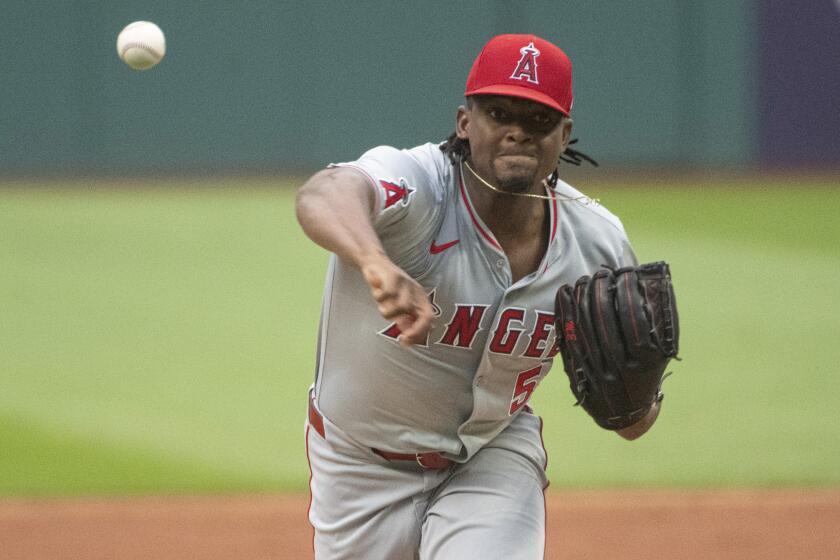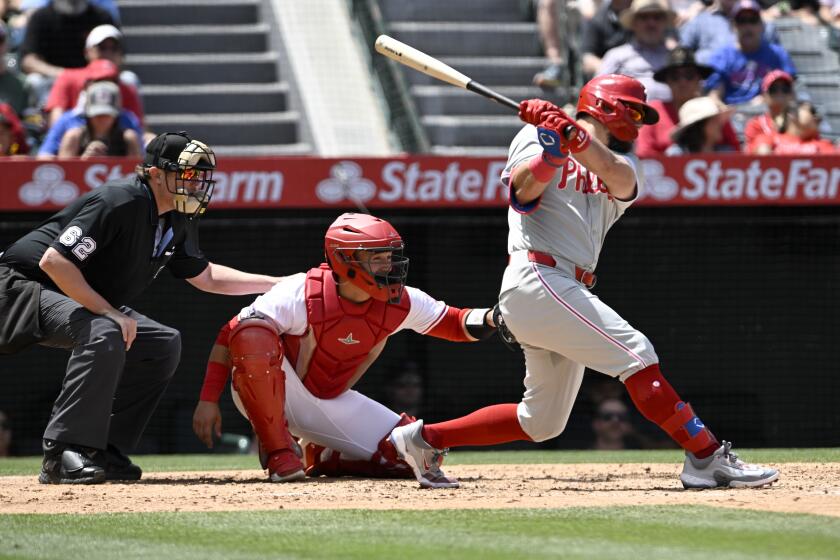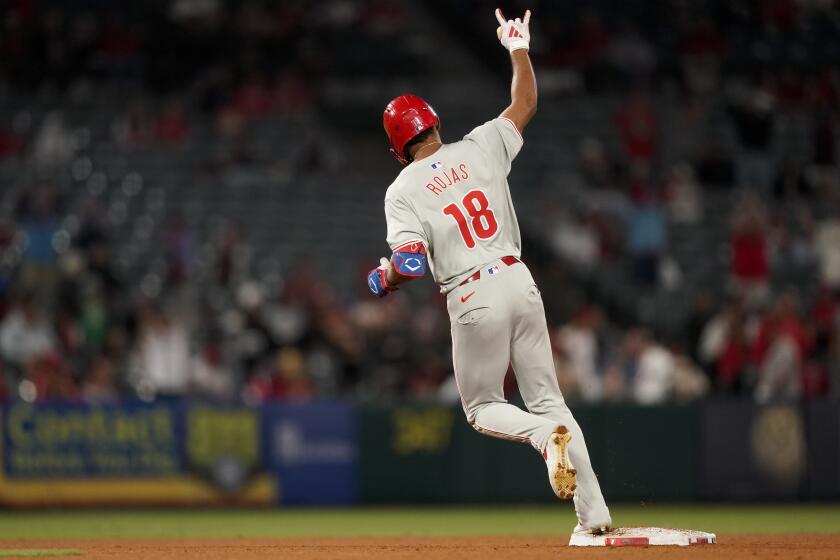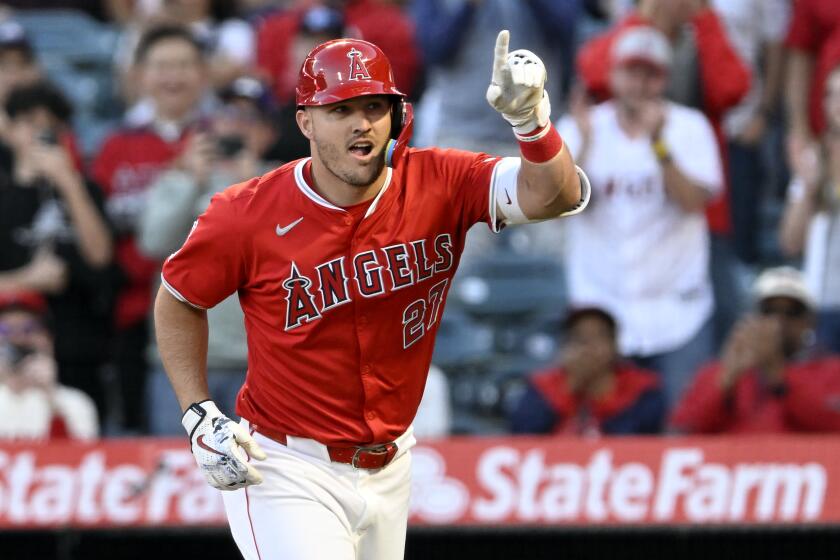Angels trying their own patience
Remember last season, when plate discipline was all the rage in Anaheim?
When new right fielder Bobby Abreu was preaching patience to veterans and youngsters alike, the notoriously free-swinging Angels jumped from 11th to third in the American League with a .350 on-base percentage and from 12th to seventh with 547 walks.
After averaging 3.65 pitches per plate appearance from 2004 to 2008 and finishing 12th or lower in that department every year, the Angels in 2009 vaulted to fourth in the AL with an average of 3.88 pitches per plate appearance.
Throw in their league-leading .285 batting average and .297 mark with runners in scoring position, and it’s no coincidence the Angels set a franchise record and ranked second in the AL with 883 runs last season.
This year? The numbers show the Angels are every bit as patient, averaging 3.91 pitches per plate appearance.
Six regulars — Abreu, Erick Aybar, Torii Hunter, Mike Napoli, Juan Rivera and Hideki Matsui — are seeing more pitches per plate appearance, with Aybar, in his first year in the leadoff spot, making a dramatic jump, from 3.47 last season to 3.76.
But patience hasn’t meant production. Entering Friday night’s game against Seattle, the Angels rank 12th in the AL with a .313 on-base percentage, 12th with 139 walks and seventh with 214 runs.
“That’s my argument — sometimes you have to be more aggressive,” batting coach Mickey Hatcher said. “When you’re swinging good and a team is scared of you, you’re probably going to draw more walks and your on-base percentage is going to go up.
“Instead of trying to work the count all the time, you might have to open up a little more and fire on those fastballs. We might get one pitch to hit in an at-bat. We have to hit it.”
Despite the loss of productive and patient leadoff man Chone Figgins and slugger Vladimir Guerrero, Manager Mike Scioscia thought this would be one of the best lineups he’s had since 2000.
But the Angels rank 10th in the AL with a .251 average and seventh with a .260 average with runners in scoring position, subpar marks that have put a drag on the offense. They’re also hitting .178 with two strikes, compared with .208 last season.
“There are a lot of guys on our club who are underachieving,” Scioscia said. “We need guys to get into their game, not to be supermen, but to bring what they can do on a daily basis.”
It all starts at the top.
Rather, too often it stops at the top.
Aybar hit .312 with a .353 on-base percentage and 70 runs in the ninth spot in 2009, and the Angels would have gladly plugged those stats into the leadoff spot and taken their chances. But his transition to the top of the order has been rocky — he’s hitting .242 with a .311 on-base percentage.
Though the shortstop has drawn 19 walks, which would project over a full season to a career-high 62 walks, he ranks fourth on the team with 35 strikeouts.
He’s trying to work counts, which is part of a leadoff batter’s job, but has dug himself too many holes — he’s batting .181 with two strikes and .091 after 0-and-2 counts.
“He’s putting so much pressure on himself to be that leadoff guy; we’re just trying to get him to play the game,” Hatcher said. “Erick has always been the best fastball hitter on the team. He’s given up a lot of fastballs trying to be a patient hitter.”
Aybar has made strides recently, with five multi-hit efforts in nine games, but could be relieved of his leadoff duties once Maicer Izturis finds his timing.
Izturis, who was activated off the disabled list Tuesday and took over for struggling third baseman Brandon Wood, could be a better leadoff option, allowing Aybar to drop to the eighth or ninth spot.
“I love Izturis — he helps us win, big-time,” Hunter said. “Every time he plays, we seem to win. The team is different when he’s in there.”
Izturis is batting .267 with a .382 on-base percentage in 16 games, and he hit .300 with a .359 on-base percentage, 74 runs, eight homers and 65 RBIs in 114 games last season. The switch-hitter is also great in the clutch, entering 2010 with a career .327 average with runners in scoring position.
“He’s an outstanding hitter from both sides,” Abreu said. “He could take some pressure off Aybar, and that might help him a little bit. You don’t realize how valuable Izturis is until he’s gone.”
The Angels still need more offense out of Abreu (.272 average, .352 on-base, five homers, 25 RBIs), Matsui (.237 average, .311 on-base, six homers, 24 RBIs) and Rivera (.235, .288 on-base, six homers, 20 RBIs).
But there have been encouraging signs of late, the Angels scoring 69 runs in their last 12 games.
Napoli is on a tear, batting .320 with seven homers, nine doubles and 15 RBIs in May; Matsu hit a clutch two-run homer Wednesday, and Kendry Morales (.286, 10 homers, 34 RBIs), Hunter (.278, seven homers, 28 RBIs) and Howie Kendrick (.257, 11 doubles, 22 RBIs) are having solid seasons.
“In the last week or so, I’ve seen better at-bats,” Hatcher said. “We’re putting ourselves in situations we can score, and that’s all you can ask for. You know these guys are going to click. Sometimes you’ve got to battle through tough times.”
And be patient.
Clicking on Green Links will take you to a third-party e-commerce site. These sites are not operated by the Los Angeles Times. The Times Editorial staff is not involved in any way with Green Links or with these third-party sites.
More to Read
Go beyond the scoreboard
Get the latest on L.A.'s teams in the daily Sports Report newsletter.
You may occasionally receive promotional content from the Los Angeles Times.





